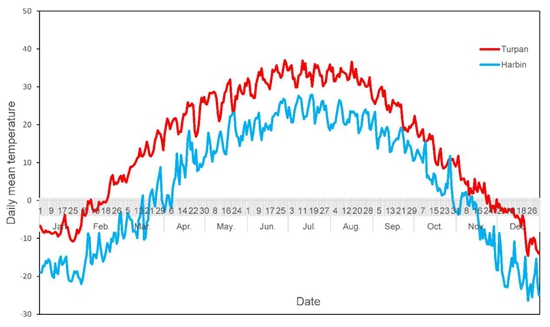分享到
Heritability and Evolutionary Potential in Thermal Tolerance Traits in the Invasive Mediterranean Cryptic Species of Bemisia tabaci (Hemiptera: Aleyrodidae)
Recently, researchers at State Key Laboratory for Biology of Plant Diseases and Insect Pests, Institute of Plant Protection (IPP) of CAAS, have a new finding on invasive Mediterranean (MED) Cryptic Species of Bemisia tabaci about heritability and evolutionary potential in thermal tolerance traits. The research results have been published online in PLOS ONE on July 23, 2014.
With advancing global climate change, the analysis of thermal tolerance and evolutionary potential is important in explaining the ecological adaptation and changes in the distribution of invasive species. The B. tabaci MED cryptic species can cause rapid and widespread invasions and is considered particularly dangerous. The high heat-resistance ability of B. tabaci MED is one of the potential mechanisms underlying its invasive success. We consider B. tabaci MED to be an excellent research subject for rapid adaptive evolution.

The daily mean air temperatures in Harbin and Turpan, China, in 2012
Narrow-sense heritability (h2), variance, and coefficient of variation components for heat knockdown time and chill coma recovery time (Harbin and Turpan populations) of B. tabaci MED cryptic species

With advancing global climate change, the analysis of thermal tolerance and evolutionary potential is important in explaining the ecological adaptation and changes in the distribution of invasive species. The B. tabaci MED cryptic species can cause rapid and widespread invasions and is considered particularly dangerous. The high heat-resistance ability of B. tabaci MED is one of the potential mechanisms underlying its invasive success. We consider B. tabaci MED to be an excellent research subject for rapid adaptive evolution.

The daily mean air temperatures in Harbin and Turpan, China, in 2012
Narrow-sense heritability (h2), variance, and coefficient of variation components for heat knockdown time and chill coma recovery time (Harbin and Turpan populations) of B. tabaci MED cryptic species

To reveal the variation of heat resistance and evaluate the evolutionary potential in the invasive B. tabaci MED, the present study reports the trait means and variations in heat and cold resistance of B. tabaci MED. By estimating the heritability of thermal tolerance, the study shows that B. tabaci MED exhibits high variance in its response to heat stress and has displayed modest evolvability after its successful invasion in China. Natural B. tabaci MED cryptic species exhibits a high adaptive potential against both heat and cold stress. The whiteflies are more able to respond to heat selection in field MED populations than cold selection. It suggests that B. tabaci MED expansion is likely to be favored by climate warming and that the high evolutionary potential of heat tolerance has enabled its invasion into mid- and high-latitude areas.
More details are available on the bellow links:
http://www.plosone.org/article/info:doi/10.1371/journal.pone.0103279
More details are available on the bellow links:
http://www.plosone.org/article/info:doi/10.1371/journal.pone.0103279
By Zhichuang LV
zclv@ippcaas.cn
zclv@ippcaas.cn
Latest News
-
 Apr 18, 2024Opening Ceremony of the Training Workshop on Wheat Head Scab Resistance Breeding and Pest Control in Africa Held in CAAS
Apr 18, 2024Opening Ceremony of the Training Workshop on Wheat Head Scab Resistance Breeding and Pest Control in Africa Held in CAAS -
 Apr 03, 2024IPPCAAS Co-organized the Training Workshop on Management and Application of Biopesticides in Nepal
Apr 03, 2024IPPCAAS Co-organized the Training Workshop on Management and Application of Biopesticides in Nepal -
 Mar 28, 2024Delegation from the School of Agriculture and Food Science of University College Dublin, Ireland Visit to IAS, CAAS
Mar 28, 2024Delegation from the School of Agriculture and Food Science of University College Dublin, Ireland Visit to IAS, CAAS -
 Mar 25, 2024Director of World Food Prize Foundation visited GSCAAS
Mar 25, 2024Director of World Food Prize Foundation visited GSCAAS -
 Mar 20, 2024Institute of Crop Sciences (ICS) and Syngenta Group Global Seeds Advance Collaborative Research in the Seed Industry
Mar 20, 2024Institute of Crop Sciences (ICS) and Syngenta Group Global Seeds Advance Collaborative Research in the Seed Industry
